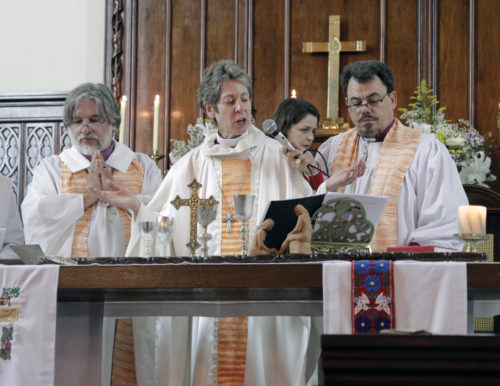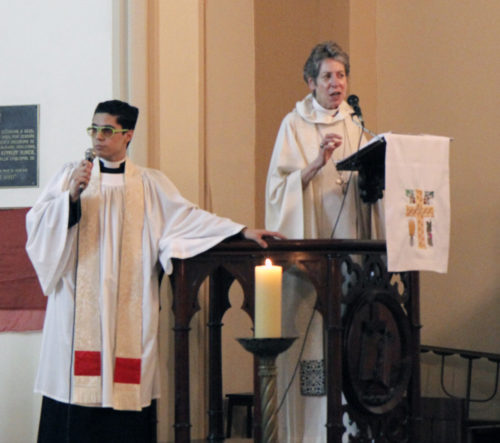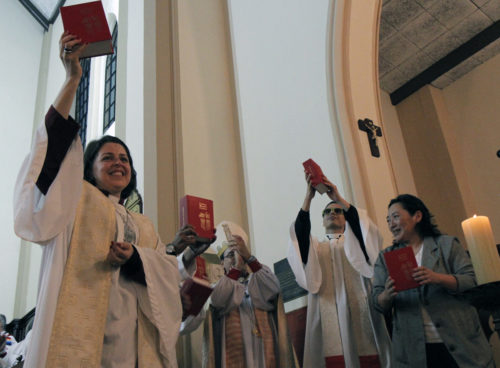Brazilian church celebrates 125th anniversaryPosted Jun 11, 2015 |
|

Presiding Bishop Katharine Jefferts Schori, Archbishop Francisco de Assis da Silva, right, and Bishop Humberto Maiztegue of the Diocese of Meridional, co-celebrated during the June 7 Eucharist celebrating the 125th anniversary of the Episcopal Anglican Church of Brazil. The church also celebrated 50 years of autonomy and 30 years of women’s ordination. Photo: Lynette Wilson/ENS
[Episcopal News Service – Porto Alegre, Brazil] For 125 years the Episcopal Anglican Church of Brazil has been building the reign of God through its pursuit of mission across what is the largest country in South America, with the help of both local partnerships and strong, historical ties with the U.S.-based Episcopal Church in a spirit of “oneness.”
“This Episcopal Anglican Church of Brazil has the same vocation of oneness that Jesus asks for his disciples,” said Presiding Bishop Katharine Jefferts Schori, during a sermon delivered June 7 at Most Holy Trinity Cathedral in Porto Alegre, the southern city where the Episcopal Anglican Church of Brazil was established in 1890 by two missionaries sent by Virginia Theological Seminary.
“Your history here has been a long process of drawing people together in ways that bless them. Your gift has been the conviction that oneness in the Church is supposed to bless the wider community as well. Becoming one begins in sharing the good news of God’s love for all and teaching people how to live together as friends – friends of God and one another. We see that oneness happen in congregations and in the ways in which their members are present in the wider community – feeding, teaching, healing and seeking justice,” she said.

Presiding Bishop Katharine Jefferts Schori preached during the June 7 Eucharist at Most Holy Trinity Cathedral in Porto Alegre, Brazil, the birthplace of the Episcopal Anglican Church of Brazil. The Rev. Luiz Coelho, of the Diocese of Rio de Janeiro, translated the sermon from English to Portuguese. Photo: Lynette Wilson/ENS
More than 200 people gathered in the early evening at Most Holy Trinity Cathedral, the Episcopal Anglican Church of Brazil’s national cathedral, for the three-hour service marking the church’s 125th anniversary, 50 years of autonomy and 30 years of women’s ordination. In addition to preaching, the presiding bishop celebrated alongside Archbishop Francisco de Assis da Silva and Bishop Humberto Maiztegue of the Diocese of Meridional, where the cathedral is located.
Since the signing of a bilateral covenant in 1990, following a period of separation, the U.S.-based Episcopal Church and the Episcopal Anglican Church of Brazil have been working to reconnect, re-establish friendships and encourage partnerships and companion relationships between the two churches.
“In the last 20 years the relationship has become even more important. I think they can teach us an awful lot about the missional push out to the places that have never seen any good news, or are in urgent need of it,” Jefferts Schori told Episcopal News Service, referring to the church’s missionary work with indigenous people that stresses solidarity and accompaniment, rather than giving. “That’s a remarkable point of view and theology that most people in the U.S. part of the church would never understand or never start with.
“Brazil is at a post-colonial place, and is very confident about it and that is something we could learn from. That it’s not about bounteous giving, which has been The Episcopal Church’s M.O. (modus operandi) for a long time. It’s less so today, but that’s what we are famous for. We are beginning to learn how to be in solidarity, but the church here already knows how and could teach us an awful lot.”
The Episcopal Anglican Church of Brazil has been rooted in mission throughout its 125 years of existence; the mission field established in the south has spread to remote corners of the Amazon, as well as more recently into the northeast. Still, as with the U.S.-based Episcopal Church, the Episcopal Anglican Church of Brazil weathered more than a decade of schism related to human sexuality and ethics, both heterosexual and homosexual behavior, explained da Silva, in an interview with Episcopal News Service on June 6.
The church chose the theme “unity and thanksgiving” as a reaffirmation of its commitment to mission and service, through “unity” not “uniformity,” and to express its gratitude for its rich history, as well as its commitment to move forward as one church, he said.

The Very Rev. Mannez Rosa dos Santos, dean of Most Holy Trinity Cathedral in Porto Alegre, Brazil, and others who worked on the 1,181-page Book of Common Prayer, adapted for the Brazilian context, celebrate its introduction during the 125th anniversary Eucharist on June 7. Photo: Lynette Wilson/ENS
Additionally, the church is thankful for the publication of its 1,181-page Book of Common Prayer, which was nine years in the making and is adapted to the Brazilian context, including gender inclusive and colloquial language that sets a course for the future, he said.
“Our church has a sense of openness to the future,” said da Silva.
The presiding bishop spent three days in Porto Alegre, where she and the Rev. David Gortner, who represented Virginia Theological Seminary, got to better know the Brazilian church; they met with an interreligious group, visited with the staff of a diocesan environmental education program for children, a Guarani village and an elder-care facility operated out of a church. On June 6, the presiding bishop gave a lecture on the episcopate and sexism during a conference of lay and ordained women theologians that coincided with the weekend’s events.
“There are abundant signs of that oneness here – in the profound respect shown to every member of the interreligious group we met here on Friday; in your conscious and pro-active empowerment of women, sexual minorities, and indigenous people; (and) in your care and solidarity with all the poor, including our poor, abused environment. Together, all God’s people are working to build a more effective whole,” said the presiding bishop in her sermon.
“This celebration is about that growing health and wholeness, and lots of boundaries have been broken down to bring us to this point. For anyone who doesn’t have a clear sense of what life is truly about – and that’s every one of us at some point– your new prayer book will help people recognize the holy all around us and within us. It will bring us closer to a church that truly does respect the dignity of every human being, male and female, gay and straight, the descendants of every nation, and the other parts of God’s creation.”
The presiding bishop’s presence, said the Rev. Arthur Cavalcante, the church’s provincial secretary, was a testament to the historical relationship between the two churches and a “sign that we can continue to build the mission of God we are charged with.”
In 1890, two missionaries from Virginia Theological Seminary, Lucien Lee Kinsolving and James Watson Morris, established the church in Porto Alegre, in the southern state of Rio Grande do Sul.
In 1907, the missionary efforts in Brazil resulted in the establishment of a missionary district of The Episcopal Church under the leadership of Kinsolving, who by then was a bishop.
“I’m continually moved by Virginia’s heritage and its influence on Christian and Episcopal mission, and that we’ve consistently emphasized the growth of an indigenous church with indigenous leadership,” said Gortner, professor of evangelism and congregational leadership and director of the doctor of ministry program at Virginia Theological Seminary.

The Rev. David Gortner, professor of evangelism and congregational leadership and director of the doctor of ministry program at Virginia Theological Seminary, represented the seminary at the 125th anniversary celebration. Here he reads a letter from the Very Rev. Ian S. Markham, the seminary’s dean, during the June 7 Eucharist. The Rev. Luiz Coelho, of the Diocese of Rio de Janeiro, translated the letter from English to Portuguese. Photo: Lynette Wilson/ENS
Gortner participated in the June 7 service by reading a letter from the Very Rev. Ian S. Markham, the seminary’s dean, and on June 6, during a reception, a letter from the Rev. Robert Heaney, direct of the Center for Anglican Communion Studies.
“The people in leadership roles are remarkable, committed and passionate and show a real joy in ministry,” said Gortner, in an interview with ENS.“I admire the ways they seek to partner with and advocate for the poor and the marginalized and those who don’t hold power in this society. I hope for more influence that can only come with growth.”
Brazil is the world’s fifth largest country both geographically and by population, with more than 200 million people. Though Roman Catholicism is no longer the state-sponsored religion, it has more Roman Catholics, 123 million, than any other country in the world. The Episcopal Anglican Church of Brazil, by contrast, records 120,000 baptized members, and a regular Sunday attendance of about 25,000 worshippers.
The church’s historical ties to the seminary and The Episcopal Church, more so than its ties to the Anglican Church, which established Anglican chaplaincies to serve expatriates, carries great importance.
“The presence of the Virginia missionaries has always been relevant and very important to the church in Brazil in starting the mission here,” said the Rev. Glenda McQueen, the Domestic and Foreign Missionary Society’s officer for Latin America and the Caribbean, adding that the church also experienced a period of separation from the seminary that it hoped to remedy. “So being able to reconnect with Virginia Seminary has been very important in connecting with where the mission started, and the people that came.
“Also, the relationship with The Episcopal Church has been important for Brazil to maintain and to strengthen and that relationship has been very important throughout the years, so the presiding bishop’s presence speaks to that relationship and that partnership. I believe also especially the celebration of the 30 years of ordination of women serves to highlight women’s leadership where, historically, the leaders have all been men. But, it’s the partnership for them that is really, really important, and Virginia coming was just the icing on the cake.”
In the 1950s, the Brazilian church began talking about its autonomy, and in 1965 the missionary district became the autonomous Province of Brazil.
During the Cold War – a time when the U.S. government regularly backed right-wing governments in an attempt to thwart the spread of communism in Latin America, at times participating in the overthrow left-leaning leaders, including the 1964 military coup that ousted Brazil’s president João Goulart – a resurgent nationalism took hold in Brazil.
“Everyone knows that the U.S. played a key role in the process [coup], and people in the church began to feel nationalistic,” said da Silva, adding that the church became in independent province the next year.
The Episcopal Church continued its financial support of the Episcopal Anglican Church of Brazil until 1975. Still, the church lost many of its clergy, who were previously paid in U.S. dollars rather than the weaker local currency, and the church was forced to sell off properties.
“The process of autonomy was not rightly led and it became a great challenge for us to manage,” said da Silva. “We were completely, financially dependent.”
Fifty years later, the church celebrates its autonomy, and continues in the missionary tradition of its founding.
In addition to Brazil, The Episcopal Church has covenant relationships with Episcopal churches in Liberia, the Philippines, which became an autonomous province of the Anglican Communion in 2005, and the Anglican Church of the Central Region of America (most commonly known by its Spanish acronym, IARCA).
“Brazil is a major success story: They have grown to maturity and beyond in a lot of ways,” said Jefferts Schori, adding that Brazil was the first province to become autonomous out of the work of the Domestic and Foreign Missionary Society. “They are teaching us.”
(The Domestic and Foreign Missionary Society is the name under which The Episcopal Church is incorporated, conducts business and carries out mission.)
“They pushed us to move to a new level of relationship,” said the presiding bishop. “The Philippines have done something like that, too, in their assertive move to autonomy ahead of schedule and in bringing that enormous gift to General Convention. And long term, I hope that’s what the future is for a number of the extra-U.S. dioceses. We ought to be moving toward that kind of vision and helping them become autonomous in a way that lets them thrive. That’s what the [Province IX] sustainability work is about, I believe, long term.”
— Lynette Wilson is an editor/reporter for Episcopal News Service.

Social Menu